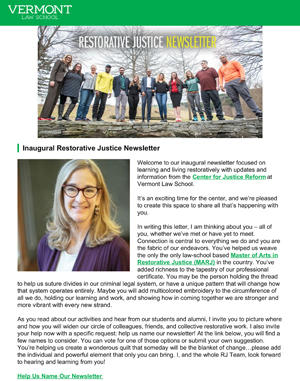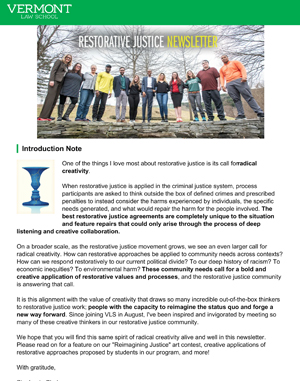The United States Department of Agriculture (USDA) National Agricultural Library (NAL) and the Center for Agriculture and Food Systems (CAFS) at Vermont Law School, partners in the Agricultural Law Information Partnership, today announced they will extend their partnership to January 2020. CAFS is developing a national Healthy Food Policy Project and will receive an additional $749,798 to support the project, bringing CAFS' total USDA NAL funding since 2014 to $2,237,071.
The mission of the Healthy Food Policy Project is to advance knowledge about local laws and policies that improve access to healthy food and promote health equity, support local economies, and/or foster improved environmental outcomes. U.S. Sen. Patrick Leahy, D-Vt., is a longtime supporter of the Healthy Food Policy Project and CAFS' partnership with NAL, the Public Health Law Center at Mitchell Hamline School of Law, and the Rudd Center for Food Policy and Obesity at the University of Connecticut.
"The partnership that USDA has formed with VLS helps to address a significant gap in agricultural law," said Leahy, who as the most senior member of the Senate Appropriations Committee originally included $750,000 for the cooperative agreement in the Fiscal Year 2014 Agriculture Appropriations Bill. "The work this relationship produces is extremely important to answering legal questions important to Vermont and other states that prioritize diversified local agriculture that also increases food access. I am pleased to see this work extended and know that it will continue to benefit Vermont farmers."
Project partners identify and document pioneering local policy innovations to increase awareness about promising policy approaches and support communities in the development of their own policy solutions. CAFS plans to provide community outreach in the form of videos, webinars, and other online resources.
"We are honored that Senator Leahy continues to support our partnership with the National Agricultural Library as we shine a light on best policies and practices that promote access to healthy food in the United States," said Professor Laurie Ristino, director of the Center for Agriculture and Food Systems. "And we are thankful to the USDA for continuing to provide funding that enables CAFS to develop practical tools for U.S. consumers, food entrepreneurs, farmers, land trusts, communities and more as we work toward a more sustainable food shelf for all."
In addition to the Healthy Food Policy Project, USDA funding will be used for "Short Projects" as identified by CAFS to create useful law and policy tools for farmers and food entrepreneurs. During the last two years, CAFS has used USDA funding to support the dissemination of agricultural and food law research and the development of legal tools related to two key sustainability issues—land tenure and gleaning. In 2015 CAFS launched a new website, nationalgleaningproject.org, to document the work of the National Gleaning Project and serve as a guide for individuals and organizations involved in agricultural gleaning and food recovery across the country. In addition, CAFS, with NAL partnership resources, is developing legal tools for land tenure—to promote the transfer and retention of farmlands and acquisition of affordable farmland by new farmers. CAFS' Food and Agriculture Clinic spearheads the land tenure project work. A Farmland Tenure Online Resources Guide can be found at farmlandtenure.org.
The Center for Agriculture and Food Systems at Vermont Law School supports scholars and practitioners in producing practical, robust scholarship for use by the food and agriculture community. CAFS offers an expanding curriculum in food and agriculture for law and policy students, and training and legal tools to help build sustainable local and regional food systems. For more information about the Center for Agriculture and Food Systems, visit vermontlaw.edu/cafs or email cafs@vermontlaw.edu.
###
Vermont Law School, a private, independent institution, is home to the nation's largest and deepest environmental law program. VLS offers a Juris Doctor curriculum that emphasizes public service; three Master's Degrees—Master of Environmental Law and Policy, Master of Energy Regulation and Law, and Master of Food and Agriculture Law and Policy; and four post-JD degrees —LLM in American Legal Studies (for foreign-trained lawyers), LLM in Energy Law, LLM in Environmental Law, and LLM in Food and Agriculture Law. The school features innovative experiential programs and is home to the Environmental Law Center, South Royalton Legal Clinic, Environmental and Natural Resources Law Clinic, Energy Clinic, Food and Agriculture Clinic, and Center for Applied Human Rights. For more information, visit vermontlaw.edu, find us on Facebook, and follow us on Twitter and Instagram.


















